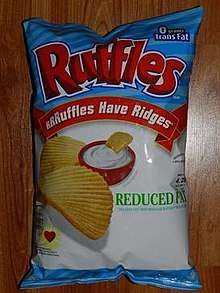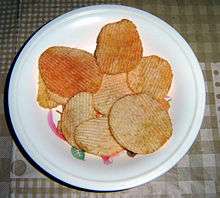Ruffles
Ruffles is a brand of ruffled (crinkle-cut) potato chips marketed by Frito-Lay since 1961. Ruffles has many different flavors of chips such as Sour Cream and Onion, Ketchup (in Canada), among others. The Frito Company acquired the rights to Ruffles brand potato chips in 1958 from its creator, Bernhardt Stahmer, who had adopted the trademark in or around 1948.[1] The Frito Company later merged with H.W. Lay & Co. in 1961.[2]
 Reduced Fat Ruffles packaging, 2011 | |
| Product type | Chips |
|---|---|
| Owner | PepsiCo (for Frito-Lay) |
| Country | United States |
| Introduced | 1948 |
| Markets | Worldwide |
| Previous owners | Bernhardt Stahmer |
| Tagline | RRRuffles have Ridges. |
| Website | Ruffles' Website |

The product is named as an analogy to the ruffle, a strip of fabric sometimes gathered, creating folds. Its longtime official product slogan is "RRRuffles Have Ridges!" The ridged corrugations are designed to create a sturdier, crunchier potato chip less prone to breakage in the bag, as well as standing up to stiffer dips.
Ingredients
Ingredients vary per flavor. The regular ("original") product ingredient list (as well as the reduced fat variant) is: potatoes, vegetable oil (sunflower, corn, and/or canola oil), and salt. They have 160 Calories per 1 ounce serving, 10 grams of fat, 150 milligrams of sodium, 350 milligrams of potassium, and 2 grams of protein.[3]
Variations
Ruffles are produced in a number of flavors in addition to the regular chips, some for regional markets: Salt & Vinegar (discontinued in 2008), Au Gratin, Sour Cream & Onion, Barbecue, Cheddar & Sour Cream, Cajun, Molten Buffalo Wing, Loaded Chili and Cheese, and Tapatio Limon. Yakisoba, Stroganoff and Honey & Mustard (Brazil), Paprika, Original and Cheddar and onion (United Kingdom), Jamón and York'Eso (Spain). Ruffles are also available in low-fat baked (not fried), reduced salt, reduced fat (25% less fat than regular Ruffles), and fat free WOW brand/Olestra versions. In 2008, Frito-Lay produced a Ruffles Thick Cut version.
Canadian flavours include Regular, All-Dressed, Au Gratin, Ketchup, Lightly Salted (50% less salt), Sour Cream & Onion, Salt & Vinegar (brought back in 2017) Spicy Ketchup (Discontinued), Hotwing (Discontinued), Sour Cream & Bacon, Loaded Potato Skins (2014)*, Jalapeño Popper Flavour (2014)*, BBQ*, Cheesy Quesadilla (2015)*, Poutine, Chili Cheese, Mozzarella 'N Marinara (2017), Cheesy Quesadilla (New Look!, 2018), Hot Wings (New Look!, 2018), Poutine (New Look!, 2018), Spicy Ketchup (New Look!, 2018), Sweet & Spicy, Ruffles Onion dip, Ruffles Ranch dip, Ruffles Buffalo Ranch Dip (2014), Flame Grilled Steak (2015), Harvey's Flame Grilled Cheeseburger (2015), Hot Wings (2016), Smokehouse BBQ (2018) (*Marketed as BRO flavours in dark blue background packaging.) Flamin' Hot BBQ (Limited Edition in Spring/Summer 2019)
In Indonesia, it is marketed under the Chitato brand, flavours include Original, Cheese, Beef Barbeque, Spicy Grilled Beef, Spicy Chicken and Barbeque Chicken.
See also
- McCoy's (similar UK product)
- Seabrook (similar UK product)
- List of brand name snack foods
References
- "Why Ruffles is Bringing Canadian Chips to America for good"
- "We Try the New Ruffles..."
- "Brand New:New logo and Packaging for Ruffles"
- “Canadian Cult-Favorite ‘All Dressed’ Chips Hit U.S. For Limited Time.”
- "Ruffles Brand Rolls Out..."
- "Frito-Lay, Inc. v. Bachman Co". Justia. Retrieved 2017-09-24.
- "History of Frito-Lay Company – FundingUniverse". Fundinguniverse.com. Retrieved 2012-10-22.
- https://www.fritolay.com/snacks/product-page/ruffles